
Rookwood Cemetery is a heritage-listed cemetery in Rookwood, Sydney, Australia. It is the largest necropolis in the Southern Hemisphere and is the world's largest remaining operating cemetery from the Victorian era. It is close to Lidcombe railway station about 17 kilometres (11 mi) west of the Sydney central business district. It was added to the New South Wales State Heritage Register on 2 April 1999.

West Norwood Cemetery is a 40-acre (16 ha) rural cemetery in West Norwood in London, England. It was also known as the South Metropolitan Cemetery. One of the first private landscaped cemeteries in London, it is one of the "Magnificent Seven" cemeteries of London, and is a site of major historical, architectural and ecological interest.

Mount Royal Cemetery is a 165-acre (67 ha) terraced cemetery on the north slope of Mount Royal in the borough of Outremont in Montreal, Quebec, Canada. It opened in 1852. Temple Emanu-El Cemetery, a Reform Judaism burial ground, is within the Mount Royal grounds. The burial ground shares the mountain with the much larger adjacent Roman Catholic cemetery, Notre Dame des Neiges Cemetery, and the Shaar Hashomayim Cemetery, an Ashkenazi Jewish cemetery. Mount Royal Cemetery is bordered on the southeast by Mount Royal Park, on the west by Notre-Dame-des-Neiges Cemetery, and on the north by Shaar Hashomayim Cemetery. It is known for its stunning views, birdwatching, cheery mix of old and new graves, meticulous upkeep, and diversity of trees. In the springtime, the Lilac Knoll section is flush with hydrangeas, and autumn leaf walking tours are frequent.
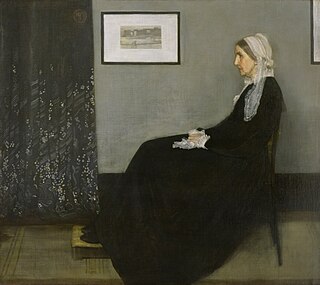
Anna MatildaWhistler was the mother of American-born, British-based painter James McNeill Whistler, who made her the subject of his famous painting Arrangement in Grey and Black No.1, often titled Whistler's Mother.
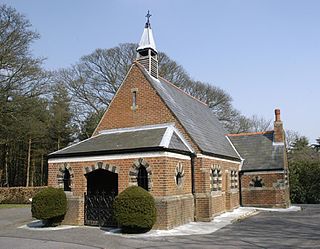
Aldershot Military Cemetery is a burial ground for military personnel, or ex-military personnel and their families, located in Aldershot Military Town, Hampshire.
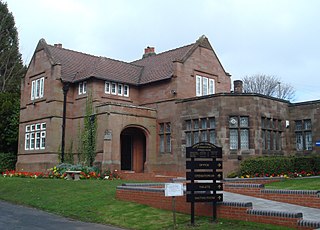
Lodge Hill Cemetery is a municipal cemetery and crematorium in Selly Oak, Birmingham, England. The cemetery was first opened by King’s Norton Rural District Council in 1895, and during the 1930s became the site of Birmingham's first municipal crematorium.

Layton cemetery is a graveyard located at Talbot Road in Blackpool, Lancashire in England. It was opened in 1873 when Blackpool parish church was replete with burying. The site encompasses 30 acres (120,000 m2), having been regularly expanded during its history. It is administered by Blackpool Council. A number of memorials in the cemetery are executed in Portland stone.
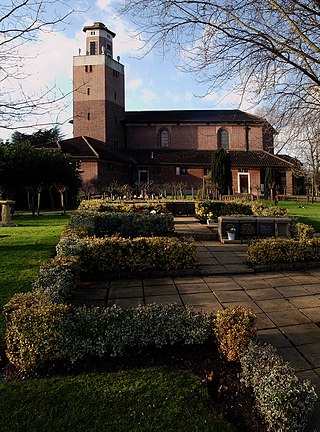
East Finchley Cemetery is a cemetery and crematorium in East End Road, East Finchley. Although it is in the London Borough of Barnet, it is owned and managed by the City of Westminster.
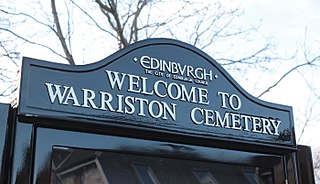
Warriston Cemetery is a cemetery in Edinburgh. It lies in Warriston, one of the northern suburbs of Edinburgh, Scotland. It was built by the then newly-formed Edinburgh Cemetery Company, and occupies around 14 acres (5.7 ha) of land on a slightly sloping site. It contains many tens of thousands of graves, including notable Victorian and Edwardian figures, the most eminent being the physician Sir James Young Simpson.

The English coastal city of Brighton and Hove, made up of the formerly separate Boroughs of Brighton and Hove in East Sussex, has a wide range of cemeteries throughout its urban area. Many were established in the mid-19th century, a time in which the Victorian "cult of death" encouraged extravagant, expensive memorials set in carefully cultivated landscapes which were even recommended as tourist attractions. Some of the largest, such as the Extra Mural Cemetery and the Brighton and Preston Cemetery, were set in particularly impressive natural landscapes. Brighton and Hove City Council, the local authority responsible for public services in the city, manages seven cemeteries, one of which also has the city's main crematorium. An eighth cemetery and a second crematorium are owned by a private company. Many cemeteries are full and no longer accept new burials. The council maintains administrative offices and a mortuary at the Woodvale Cemetery, and employs a coroner and support staff.

Karori Cemetery is the second-largest cemetery in New Zealand. It opened in 1891, and is located in the Wellington suburb of Karori.
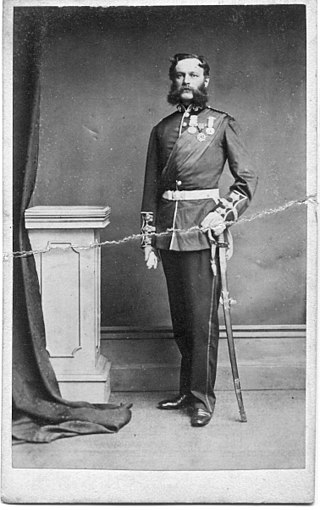
John Granville Harkness, J.P. was a major-general in the British Army during the Victorian era.

William McNeill Whistler was an American physician and a medical army officer for the Confederacy during the American Civil War. He was the younger brother of artist James McNeill Whistler.
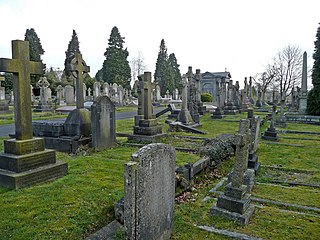
The Kent and Sussex Crematorium and Cemetery is a crematorium and cemetery located in Royal Tunbridge Wells in the county of Kent, England.

Mortlake Cemetery is a cemetery in Kew in the London Borough of Richmond upon Thames. It is also known as Hammersmith New Cemetery as it provided burials for the then Metropolitan Borough of Hammersmith when Margravine Cemetery was full. The cemetery opened in 1926 and is still in use. It is now managed by Hammersmith and Fulham Council.

Arthur Foord Hughes was an English genre and landscape artist.

Earlham Road Cemetery, Norwich also known as Earlham Cemetery or Norwich Cemetery is a cemetery located in Norwich which was officially opened on 6 March 1856 and covers 34 acres (14 ha). The cemetery is divided into two distinct sites by Farrow Road A140 which runs north–south across the site. To the east of the road is the original 19th century cemetery and to the west of the road lies the 20th century addition. Today, it caters for all faiths with separate burial grounds and chapels for Jews and Catholics and a growing one for Muslims together with two military cemeteries. The 19th century cemetery is designed with an informal garden cemetery layout with winding paths while the remainder is a more formal grid type which was favoured by cemetery designer John Claudius Loudon. Much of the original cemetery is a County Wildlife Site and contains grassland and a wide selection of mature trees.

Western Necropolis is a cemetery complex in Glasgow, Scotland located to the north of the city centre. As well as the actual Western Necropolis cemetery established in 1882, it is bordered by Lambhill Cemetery which opened in 1881, St Kentigern's Cemetery that opened in 1882, and Glasgow (Garnethill) Hebrew Burial Ground founded in 1989.

Enfield Crematorium is a crematorium located on the Great Cambridge Road, Enfield, London. It was opened in 1938 and consists of 50 acres (20 ha) of land, most of which is dedicated to the gardens of remembrance. The crematorium is a local listed red brick building.




















